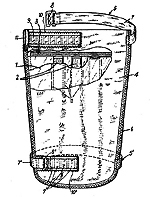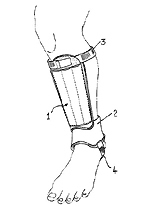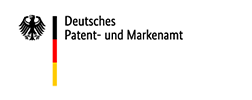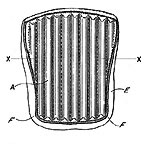Shin Guards
3. Increased flexibility and reduced weight
As early as in the 1920s, shin guard shells sometimes had a rib construction, consisting eg. of several parallel vertical strips for reduced weight and increased flexibility.
Virtually at the same time, the British patent specifications GB 228,701 and GB 235,765 described two shin guards consisting of several strips made of a hard material such as metal, which were incorporated in a leather casing. The inner face was padded with wool or rubber for increased impact absorption (Figure 6).

![]() Figure 7a: Shin guard with flexible pad bearing pockets for receiving protection strips; fastened by two straps (DE 681 11 33 U1)
Figure 7a: Shin guard with flexible pad bearing pockets for receiving protection strips; fastened by two straps (DE 681 11 33 U1)
Later embodiments of this type of construction, consisting of a flexible base plate bearing several rib or strip protection elements, used a variety of materials such as wood, bamboo, hard rubber or reinforced plastics. Alternatively, such flat rib-shaped protection elements can be arranged to overlap and be interconnected by means of elastic strips permitting relative movements between the elements. Similarly to the solid shells (cf. section 1), the ribs can be wholly air-filled or composed of foam layers for improved cushioning of blows or kicks.
Alternative structures involved spot or block shaped impact absorbing zones which enhanced flexibility along the lateral axis of the protector.
Other inventions featured ribs or strips directly incorporated in the socks or holes provided in the shell for increased flexibility. The latter solution offered the added benefit of improved air flow and heat removal.

![]() Figure 7b: Corresponding model with strap and gaiter (illustration on the state of the art from EP 0 552 804 A1).
Figure 7b: Corresponding model with strap and gaiter (illustration on the state of the art from EP 0 552 804 A1).
A very popular model consists of a soft fabric or fleece pad made of synthetic or natural fibres. Separate pockets are provided on the outer face of this pad for receiving individual protector ribs, mostly made of rigid and break-proof plastic (Figure 7a).
The earliest shin guards of this type were fastened to the player's leg by an upper and a lower calf strap.
Today's models typically have a gaiter-type anklet. The protector pad is held in place by just one calf strap closed with a hook and loop fastener (Figure 7b). Currently marketed variants of this model come in a variety of plastic and fabric materials, with either flat or rib-type protector pads.
An example of a newer shin guard with different elements is US 2010/0 205 724 A1 with a rigid band-shaped element and an outer, flexible body made of a softer, rubber-like material as a carrier.
DE 10 2006 037 268 A1 combines a moulded part made of soft-elastic, plastically deformable material with a foamed core.
Improving breathability - and thus reducing the risk of perspiration and slipping - is the focus of a multi-layer protective element with formed channels (US 2015/0 082 523 A1).
| Publication number | Year | Title | Brief description |
|---|---|---|---|
| GB 2328859 A | 1999 | Protective sportswear | Shin guard featuring a series of rib-shaped plates interconnected by means of elastic strips, permitting relative movements between the plates |
| EP 0 552 804 A1 | 1993 | A shin pad with achilles tendon protection | Shin guard with anklet and structured pad fastened by a calf strap. Figure 1 of the document shows the earlier design of a conventional gaiter-type shin guard with several pockets for receiving protection ribs, and a hook and loop strap |
| DE 30 11 566 C2 | 1980 | Unterschenkelschützer, insbesondere Schienbeinschützer für Sportler | Shin guard with block shaped impact absorbing elements made of hard plastic, arranged on the outer face of a pad made of a softer material |
| DE-OS 20 39 685 | 1970 | Sportstrumpf, insbesondere für Fußballspieler | Gaiter-type sports sock with longitudinal ribs to protect the shin, directly incorporated into the fabric |
| DE-GM 681 11 33 | 1968 | Vorrichtung zum Schutz des menschlichen Körpers gegen Stöße | Shin guard consisting of a fabric pad strapped around the lower leg, the front face bearing several individual pockets suitable for inserting protection strips |
| DE-GM 1 719 698 | 1955 | Schienbeinschützer | Shin guard with several tube-shaped, air-filled protrusions on the outer face |
| DE-PS 809 396 | 1950 | Schienbeinschutz, insbesondere für Sportler | Shin guard with several parallel rib-type protusions on the outer face, made of hard rubber |
| GB 664,623 | 1949 | Improvements in or relating to Shin Guards or Pads | Shin guard with several parallelly incorporated strips made of a rigid material such as bamboo |
| US 2,553,612 A | 1948 | Self-Grip Waterproof Distributing Shin Guard | Shin guard with hard rubber shell having several holes for improved air flow and heat removal |
| GB 235,765 | 1924 | Improvements in or relating to Shin Guards and the like | Early shin guard consisting of a pad where several stiff ribs are incorporated in a parallel arrangement |
| GB 228,701 | 1924 | Shin Guard for Association and Rugby Football, Hockey and Kindred Games | Early shin guard where several parallel strips of cane are sewn between the outer and inner cover |

